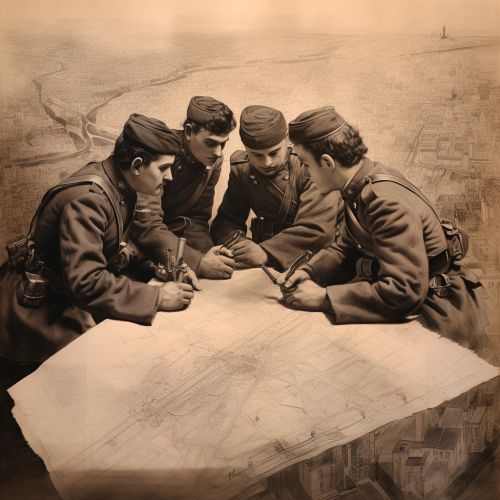Coup d'état
Definition and Etymology
A coup d'état, also known simply as a coup, is a sudden and decisive action in politics, especially one resulting in a change of government illegally or by force. The term is French for "blow of state" or "hit of state" but is often translated as "stroke of the state". As a term, it has been used in various forms since the early 19th century.
Historical Overview
Throughout history, the coup d'état has been a common method of changing political power. The coup d'état has been the frequent instrument of dictators and despots, military juntas, and revolutionary factions. Some of the most famous coups in history include the October Revolution in Russia in 1917, the Spanish coup of 1936, and the Iranian coup in 1953.
Types of Coups
There are several types of coups d'état. These include the breakdown coup, the guardian coup, the veto coup, and the bloodless coup. Each type of coup has its own characteristics and methods, and each has been used in different historical and political contexts.
Execution of a Coup
The execution of a coup d'état involves the sudden seizure of power from a government, often carried out by a small group of the existing state establishment. This can be the military, or in some cases, other institutional forces. The coup is typically swift, violent, and unexpected by the majority of the population. It is often followed by a period of martial law or the establishment of a new government.


Implications and Consequences
The implications and consequences of a coup d'état can be far-reaching and long-lasting. Coups can lead to civil war, economic instability, and widespread human rights abuses. They can also lead to a shift in regional power dynamics and international relations. The aftermath of a coup often involves a struggle for power, political purges, and societal upheaval.
Prevention and Countermeasures
Preventing a coup d'état is a complex task that requires a deep understanding of the political, social, and economic dynamics of a country. Measures can include strengthening democratic institutions, promoting transparency and accountability, and fostering a culture of respect for the rule of law. In the event of a coup, countermeasures can include diplomatic pressure, economic sanctions, and in extreme cases, military intervention.
Case Studies
Several case studies of coups d'état provide insight into the various methods, motivations, and outcomes of these events. These include the Chilean coup of 1973, the Fiji coups of 1987 and 2006, and the Turkish coup of 2016. Each case offers a unique perspective on the dynamics of power, the role of the military, and the impact on society and the international community.
